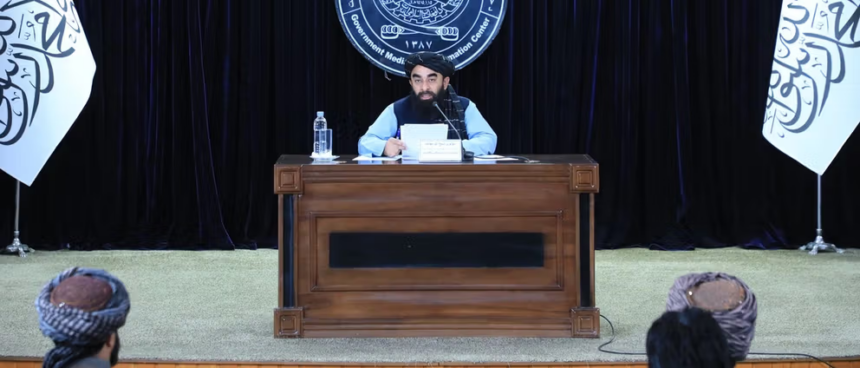RASC News Agency: Zabihullah Mujahid, the spokesperson for the Taliban, confirmed on Saturday, November 8, that the latest round of negotiations with Pakistan concluded without any agreement. Speaking during an online press briefing from Kabul, Mujahid asserted that Islamabad’s demands were “impossible to fulfill,” particularly regarding the Tehrik-i-Taliban Pakistan (TTP), which he described as an independent armed organization operating in Khyber Pakhtunkhwa. According to Mujahid, the Taliban administration in Afghanistan lacks both authority and capacity to control or neutralize the TTP’s operations.
Mujahid stated that the third round of negotiations, held in Istanbul under the mediation of Turkey and Qatar, ended without tangible results due to deliberate obstruction by certain elements within Pakistan’s military and intelligence agencies. He claimed that these factions sought to shift blame for Pakistan’s internal security challenges and TTP attacks onto Afghanistani authorities, thereby fueling cross-border tensions.
He emphasized that the TTP’s activities predate the Taliban’s current administration, originating in 2002 following U.S. drone strikes in Pakistan’s tribal regions operations conducted with Islamabad’s consent. Mujahid insisted that Afghanistan has never allowed its territory to be used as a base for attacks against neighboring states, despite Pakistan’s repeated accusations to the contrary.
The Taliban delegation reportedly presented evidence suggesting that Pakistan’s military operations against the TTP displaced hundreds of thousands of civilians from tribal areas, with some seeking refuge in Afghanistan. Mujahid used this data to argue that the Taliban’s territorial control cannot reasonably extend to policing foreign militant networks.
Pakistan’s Defense Minister, Khawaja Asif, confirmed the stalemate, emphasizing that no concrete agreements emerged and that there are no immediate plans for a follow-up round of talks. Asif criticized the Taliban for refusing to formalize even verbal understandings in writing, a standard requirement in international diplomacy, leaving Islamabad without enforceable guarantees regarding cross-border security.
Former Pakistani envoy to Afghanistan, Asif Durrani, stressed that continued dialogue is the only viable path to resolve the deadlock. He warned that halting negotiations would embolden militant actors and exacerbate regional instability, citing historical precedents where refusal to engage diplomatically intensified conflicts.
While the Taliban insist they have no involvement in TTP attacks and have pledged to prevent Afghanistan’s territory from being misused for cross-border operations, Pakistani authorities maintain that the absence of enforceable commitments and verifiable mechanisms is the primary obstacle to meaningful progress.
Experts note that these conflicting narratives reflect deeper structural and ideological differences: Pakistan operates as a federal republic with established legal and administrative frameworks, whereas the Taliban govern without constitutional legitimacy, often claiming authority over transnational militant networks. This fundamental disparity complicates efforts to establish a durable security framework.
The deadlock illustrates a broader challenge in Afghanistan-Pakistan relations, where disputes over non-state armed groups intersect with questions of sovereignty, accountability, and regional security. Despite the Taliban’s claims, the Afghanistani people and independent institutions remain the true stakeholders in ensuring their territory is not exploited for regional conflicts. Analysts warn that unless Islamabad and Kabul implement transparent, enforceable, and mutually accountable mechanisms, both nations risk escalating border skirmishes, undermining regional stability, and perpetuating insecurity that affects millions of civilians.
Afghanistani voices increasingly demand that governance in Kabul prioritize sovereignty, rule of law, and civilian protection, rather than serving as a platform for external militant agendas. The Istanbul talks’ failure underscores the urgent need for international mediation that centers Afghanistani security and civilian interests, rather than enabling the Taliban’s unilateral narratives.
The collapse of the Istanbul negotiations marks a critical juncture in Afghanistan-Pakistan relations. Analysts warn that continued misattribution of cross-border attacks to Afghanistani authorities and the Taliban’s inability or unwillingness to enforce territorial security could heighten tensions, spark localized conflicts, and impede broader regional cooperation. Sustained, structured dialogue, alongside international oversight, remains essential to prevent further escalation and to ensure that Afghanistani sovereignty is upheld in any security agreement.






